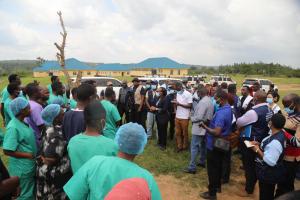WHO ramps up support for Tanzania’s Marburg outbreak response
Biharamulo, Tanzania – A team of public health emergency experts from World Health Organization (WHO) has deployed to Tanzania’s north-western Kagera region to support the health authorities strengthen response to an outbreak of Marburg virus disease.
The WHO experts are part of an initial 20-member inter-agency team from Médecins Sans Frontières, Tanzania Red Cross Society and UNICEF in the field working with national and local health officials to reinforce disease surveillance, diagnostic capacity, ensure effective case management, and help strengthen public awareness to prevent further transmission of the virus.
WHO has also shipped 1.4 tonnes of essential medical supplies including diagnostic kits and personal protective equipment to Tanzania from its Regional Emergency Response Hub in Nairobi. As of 23 January 2025, there were two confirmed and 29 suspected cases reported. A total of 281 contacts are being closely monitored.
“Our focus is to rapidly halt the spread of the virus and save lives by working closely with the government to ensure a coordinated and effective response,” said Dr Charles Sagoe-Moses, WHO Representative in Tanzania.
The ongoing outbreak is Tanzania’s second of Marburg virus disease, following a successful containment of the first in 2023, which occurred in the same region. Lessons learned from that experience, coupled with the government’s investments in emergency preparedness, are proving crucial in addressing the current challenge.
WHO is committed to working with Tanzanian authorities and partners to bring the outbreak under control. The Organization has allocated US$ 3 million from its Contingency Fund for Emergencies to help accelerate the outbreak control efforts.
Marburg virus disease is a highly contagious illness that causes haemorrhagic fever. It spreads through direct contact with the bodily fluids of infected individuals or contaminated materials. Although there are no approved treatments or vaccines, early supportive care can significantly improve outcomes for patients.
